- Home
- Warhammer 40K
Spear of the Emperor - Aaron Dembski-Bowden Page 15
Spear of the Emperor - Aaron Dembski-Bowden Read online
Page 15
Tyberia, with less battle experience, lacked my restraint. ‘Master!’
Amadeus looked up from his work, staring at us through the smoke. He didn’t answer her. He just started running. The decking quivered beneath his heavy tread as he powered towards us. Something so huge had no right to move that fast.
I realised a moment before Tyberia. I was in cover, behind a bulkhead, when the bolts started crashing around us. She hurled herself at my side, crouching behind the dense steel door I was using as a shield.
‘It’s not–’
‘I know, I know.’ I clutched my Engager to my chest and glanced at Tyberia. The ceramite bootfalls pounded closer, carnosaur-loud. My heart was thudding just as fast. A hundred dead heretics and cultists to my name, yet I was trembling like a newborn in winter. Death hammered its way down the corridor towards us.
‘We take him together,’ I said, sounding far surer than I felt.
‘What do we–’
The door exploded against us. My miscalculation almost killed us both, as the Adeptus Astartes warrior chose not to take cover; he chose to break through ours with a bull-rush charge. The bulkhead was ripped from its hinges, crashing to the deck. Tyberia and I were thrown across the gantry floor in clatters of carapace armour. I could hear him over the cacophony, the predatory snarling of his armour joints, the sickly, atomic keening of his power pack: behind me, above me, close, so close.
I moved faster then, than ever before or ever since. I rolled to my back, bringing my Engager up towards the towering shadow, firing at point-blank range. I had one split second of vindication: that Engagers were Space Marine-killers; that he was close enough to hit; that no matter my fear, he couldn’t survive a blast like this.
The shotgun roared in my hands.
I missed.
The shadow above me was a blur of motion. My hands moved without thought, chambering another round. Crunch-click. I fired again.
And missed again. My senses were half a second behind the warrior’s blurring movements. As I fired, he was already weaving away with protesting armour joints. As I chambered a shell, he was already raising his blade.
He kicked the Engager from my hands, hard enough that my fully bionic arm sent a knife of pain through my shoulder. Gunless and on the ground before this god of war, I discharged my terminus-eye. The blast lasered through my helmet, destroying my visor, lancing past the shadow’s raised arms. I missed again. The terminus beam relied on striking where I was looking, and I could barely follow his movements.
Tyberia’s Engager barked from the side. The descending sword sparked with detonating shell fragments and whirled from the warrior’s hand. She caught his weapon, but we couldn’t hit him. We could barely see him.
One of us, I wasn’t sure whether it was me or Tyberia, shouted to aim for the head, aim for the head. The other yelled that they were trying.
The warrior in white moved back in the same furious blur of motion. My reaching grip found my fallen Engager and I fired again, aiming for his head – this time he buckled, staggering off balance. I didn’t see if I’d hit him, I could only guess. When he turned away, I saw the crimson basilisk on his white pauldron: the serpent circling an orb that could only represent a subjugated world.
My shot bought us both a precious few heartbeats to scrabble away. We moved like panicked villagers before a tidal wave – nowhere to go, nowhere to run, fleeing in mindless, animal instinct. I’d only seen Mentors and Spears move the way the Pure moved. To be on the wrong side of that breathtaking violence was a lesson I’d gladly never have learned.
I made it to my feet in time to meet the warrior’s fist. The force was unreal, a beast’s kick to the sternum, driving all breath from my body, shattering my carapace breastplate, hurling me against the corridor wall with enough force that I felt my helmet crack and my skull crack inside it. My cheekbone crunched like pebbles. For a second I was sure I was dead – down on my knees against the wall, blinded by greyness, slavering bile into my rebreather. I groped for the Engager that had tumbled from my grip. I think I said something. I have no recollection of what, or why.
Tyberia’s shotgun bellowed. The shadow above me thrashed but didn’t move away. A talon of ceramite tore at my face, ripping my helmet free, and I screamed because my eye came away with it. I felt the snap, the disconnection of the optic bindings from my broken eye socket.
Tyberia’s Engager roared again. Shell fragments scratched me with cutting heat. I thought, with dizzy surety, she hit me, she hit me.
The warrior cast me down to the deck again. Tyberia cried out as the shadow-giant moved on her. I felt, but didn’t see, the slam as Tyberia struck the corridor wall.
One last time, my hand slapped on my fallen Engager. I raised it, glaring with my remaining eye, firing at the brute’s back. Once, crunch-click, twice, crunch-click, thrice, crunch-click.
The Pure turned to me. His red eye-lenses blazed. He took a step towards me… and went to his knees with a crash louder than any other yet. He raised an empty hand to the blown-out ruination of his chest, where his fingertips stroked over the mangled ceramite crater, filled with wet red pulp that had been his organs and flesh only seconds before.
And still he came for me. He fell to the deck, dragging himself towards me with both hands. I fired my last round, taking him in the faceplate, snapping his head to the side as the Engager round bored through his skull and blasted a red spray out the back of his helm. Laughter gargled from the half of his head that remained. He spoke, though the words were mangled without half of his face.
My reply was wordless, furious fear. I screamed as I dived on him, and in my hands was the priceless power sword that I’d neither earned nor deserved. I rammed it down with both hands, hilting it in his body. The second blow daggered through his spine in a clean plunge, carving deep into the deck beneath him. I know there was a third, as well as a fourth, but I lost count after the fifth. There were more. I just don’t know how many more.
Finally, he lay still.
I stumbled from his back, crawling away from what I prayed was his corpse.
‘Throne of the God-Emperor,’ I panted, slumping with my back to the corridor wall. ‘Throne of the God-Emperor.’
Tyberia was unconscious. Maybe dead, for all I knew. I tried to focus on my monitron bracer, to vox to Amadeus, only to see it’d been smashed in the fight. It flickered, detuned and unreliable.
‘Anuradha,’ said a voice, further down the corridor.
‘Master?’ I looked through the haze of smoke.
No. It wasn’t a Space Marine; it was a skeletal figure, reaching out to me, not in hostility but pained need. I knew him at once. There was no way I could mistake who it was. We were in the warp, the realm of the dead, and the dead had come to welcome us.
‘Water,’ my father said to me. ‘Anuradha. Water. Please.’
XIV
THE ENEMY WITHIN
1
My father died when I was eleven standard years old. My mother was long dead by then; she died bringing my brother Narakhir into the world, nine years before.
I must be careful with these words. I can’t speak too deeply of my childhood, for even here on the wrong side of the galaxy, fated never to return to my former Chapter, I won’t break the oaths of secrecy I swore to the Mentor Legion. But I can speak of this. I have to, for what came next.
My father served the Mentors, as his parents had, and his parents’ parents. The Daaz bloodline had toiled for Chapter 888 since we were first taken from a world I am forbidden to speak of. We lived in the regulated human habitation sectors of a fortress-monastery I will not name, on a world whose location I won’t share.
And we were, if not happy, then at least safe and content. We provided for the Chapter. The Chapter provided for us.
It was customary to make patchwork leather cloaks and book bindings from the skins
of our forebears as a means of honouring those that had served before us. As barbaric as it may sound, even to the headhunting tribes of Nemeton, the custom was performed by funerary surgeons in their sterile laboratories, and there was nothing gory or grisly in the tradition. The deeds of the dead were written on the flesh-leather in meticulous calligraphy. My father went about his duties in the processed leather cloak made of his grandparents’ hides. We saw nothing morbid in the practice. It was simply the way things were.
This was life in the lowest tiers of serfdom. Everything was precious. We wasted nothing. We were cold but never freezing, hungry but never starving.
My father’s name was Ishahan. He worked in a hydroponics district, cultivating protein-rich plants to be rendered down into nutrient paste for the Mentors’ warriors and their vast population of Chapter-serfs. Some of the hydroponics cultivators had talents in rarer or more difficult growths, such as the plant strains used as healing poultices, stimms or combat narcotics in the Chapter’s apothecarion. My father wasn’t one of these gifted few. He was just a man, loyal and hard-working.
He was killed by a sickness of the internal organs, but before the disease killed him, it devoured him alive. Over the weeks he grew pale and weak, painfully sensitive to light and sound, losing all appetite. Still, he kept working his tasks, leaning on those around him when the burden of his duties and long hours of toil began to weigh heavily.
I think he knew, even then, that he was dying. I remember how he would return to the communal hab-chamber we shared with twenty other families, smiling in the low light as he watched my brother and I, even offering us portions of his rations and promising that he wasn’t hungry. Lying, to keep us strong, as he withered from within.
The disease took him swiftly. We were far below any rank worthy enough to receive medicae aid from our masters, though serfs from the apothecarion sector did grant us a limited supply of pain suppressants to ease his passage to the God-Emperor’s side. They weren’t enough.
He diminished before our eyes until he was nothing but a husk, and then he lived on past the point of pain, past the point of mercy. One night, as we slept on either side of him to share our warmth, we listened to his dry, clicking breaths, certain each one would leak slowly out and never be dragged back in.
Deep in the night, he called my name. Just the barest whisper. His dry eyes barely opened, his cracked lips barely moved, but he croaked my name. He wanted water. That was all he ever wanted any more.
I shook my canteen. It was empty.
‘Stay with him,’ I told my brother. He was two years younger than me. His eyes were wide as I slipped from our blankets.
‘Where are you going?’
‘To get water. Just stay with him.’
‘No.’ This, from my father. He managed to sit up. I can’t imagine the strength it took for him to make that smile look real. ‘I’ll go.’
I told him that I’d go, but he wouldn’t hear my protests. ‘Sleep, both of you. I’ll be back soon.’
He brushed my brother’s black hair back with a palsied hand, then repeated the gesture with me. He was a skeleton of a man by that point, his eyes dull, his teeth loose, his muscles soft. For years my brother believed it was pride that forced our father up that night, to go for water without help.
But I know better. I’ve always known better.
He cloaked himself and left us to our rest. My brother slept. I did not. I lay awake, looking up at the ceiling of metal and stone, for an hour. Then two. Then three. Our father still hadn’t returned.
I followed him, then.
I walked through hab-chambers crowded with other sleeping serfs, through long, cold hallways, down great stone stairways. The fortress was vast. Water for the thralls came in through artesian wells in the bedrock, in the deepest levels. Every hab-sector had a dozen of these sources.
I’d always hated this chore more than anything else. The caverns were huge and dark and home to strange sounds beneath the trickling flow of water from the aquifers. Knowing that we were safe within the void-shielded walls of a fortress-monastery was a comfort for adults. I was a child, and every time I ventured down there in the dark, my mind conjured a thousand monsters. Things that would clutch at my ankles if I walked too slow. Things that would see me, hear me, and give chase if I ran too fast.
My father knew how I felt. That’s why he’d gone. Protecting me from my fears, one last time.
I found him by the artesian well. He had died just short of reaching it, his body stretched out on the ground, frozen in mid-crawl. There was no peace in his repose. One arm was still reached out in futility, curled fingers falling just short of the well’s edge. His face was a rictus of torment, the twinned pain of his sickness and dying thirst twisting his features into a horrifying mask of desperate want. He’d died in agony, savagely thirsting, and falling short of even that final, primal need.
I covered him with his cloak, so I wouldn’t have to look at his face any more. But I stood there, by his side in the dark, for a long time. No matter how many years passed, no matter what I learned or how much data I inloaded, I never forgot the way he looked, his face painted with the pain he’d put himself through in one last act of love.
That was the face staring at me in the hallway aboard the Hex.
2
‘Anuradha,’ my father said. He was brittle and thin, cloaked in his parents’ leather, his movements stilted and slow, just as I remembered. A parched and shaking revenant, wearing the face of my guilty dreams.
He reached for me with trembling fingers. I could smell the rot in him, the disease that blackened his organs, decaying him while he still lived. His eyes were swollen and yellow, ripe in their sockets. His tongue was a dry worm rolling across cracked lips.
‘Water, Anuradha. Please.’
It was him. Not taken to the God-Emperor’s side at all, but drawn into the warp after his death. We’d sailed unshielded through the land of the dead, and now the dead walked among us.
He didn’t melt into a horrifying, daemonic form to leap at me. No hatred or fury burned in his eyes. He was my father, a ruined husk of a man just as he’d been when he died, reaching for me with the same hope that he’d once reached for a last drink of water.
‘Your mother is here, Anuradha.’
His fingers grazed my throat. Stroking my skin.
‘And Narakhir is with us,’ he said, lowering his voice. His fingers closed. Tightened. ‘Narakhir is with us.’ There was no triumph in his tone, no malicious glee. Only sorrow. ‘Narakhir is here. I swear it.’
I tried to draw breath, though I have no idea what use my stuttering denial would have been, even had I been able to voice it.
A ceramite fist clutched a handful of my father’s thinning hair and pulled him away from me. He screamed in pain, but there was no mercy in that grip. He tried to turn, scrabbling at Amadeus’ armour with weak fingers, a sick man pleading not to be hurt.
Amadeus smashed him, headfirst, into the corridor wall. The first time silenced his cries, breaking the bones of his face. The second time, his skull crumbled in my master’s grip, leaving a red smear against the metal.
Amadeus dropped the headless corpse to the deck. Red eye-lenses glared down at me as he snarled in a tone at odds with his supreme composure.
‘Focus, Helot Secundus.’
I flew at him. Fifteen years of training were cast aside in a heartbeat as I threw myself at my master, hammering a blow with my bionic fist that sent cobweb cracks across the aquila emblazoned on his breastplate. He caught me before I could hit him again, and shoved me against the wall. I felt my father’s blood hot against the back of my neck, and my broken skull flared with fresh pain.
I told Amadeus what he’d done. I told him who he’d just destroyed. He shook me, not gently, banging the back of my cracked head against the gore-marked wall a second time.
I stared into his eye-lenses, seeing no sign of humanity behind them, knowing only that he was wrong, that his miserable Chapter had let my father die all those years ago, and that now he’d killed my father’s shade because he was an angel incapable of feeling anything but cold, divine fury.
Amadeus gripped me harder and leaned in close, my bleeding face to his faceplate. ‘Ishahan Daaz died loyal to the Throne, long ago. He is with the Emperor.’
Other figures drew near. Spears. I recognised Tolmach and Faelan.
‘Focus,’ Amadeus said again. ‘Fight. Or stay here and die as you weep over the lies of daemons.’
He released me. I looked at my father’s body, but the ghost was gone. A husk lay there, something cadaverous and centuries dead; something clawed and dark and rotten that had never been born from mortal body, only a tortured mortal mind.
With fingers that trembled as much as my father’s hands had done in the last days of his life, I reloaded my Engager.
‘I understand,’ I told my master. And for a lack of anything else that made sense, I aimed the gun vaguely towards the slain heretic warrior. ‘He took my eye.’
Amadeus laughed softly, beneath his breath. I’d never heard him laugh before. ‘We will arrange for a new one,’ he said. ‘You did well, both of you.’
Faelan nudged the dead Pure with his boot. ‘You took this bastard to pieces.’ His tone danced on the edge of admiration. I didn’t need to tell him how close it had been; one look at Tyberia and me told that story in its entirety.
She stirred, coming to with immediate panic when she saw Tolmach crouched before her. If she’d had a weapon in her hands, she might well have shot him without thinking.
‘Be calm,’ he said. ‘Easy, easy.’
The druid injected her with a cocktail of combat stimms and his own blood, to act as both painkiller and adrenal amplifier. When he offered me the same, I accepted it gladly. The nausea from my broken skull only faded to a background pulse rather than vanishing completely, but I could at least stand without vomiting.

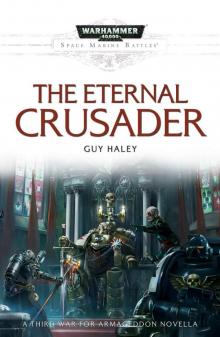 The Eternal Crusader - Guy Haley
The Eternal Crusader - Guy Haley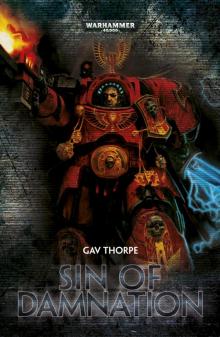 Sin of Damnation - Gav Thorpe
Sin of Damnation - Gav Thorpe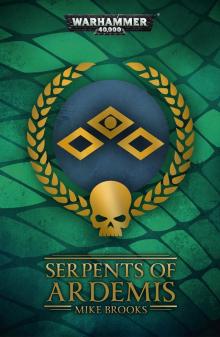 Serpents of Ardemis - Mike Brooks
Serpents of Ardemis - Mike Brooks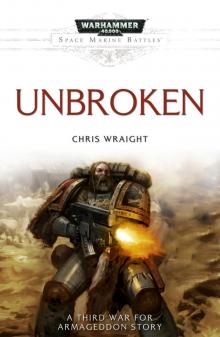 Unbroken - Chris Wraight
Unbroken - Chris Wraight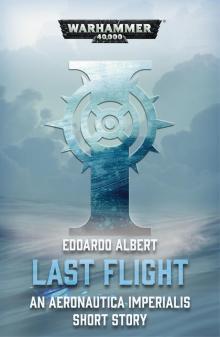 Last Flight - Edoardo Albert
Last Flight - Edoardo Albert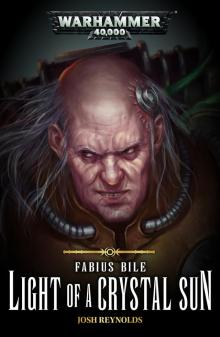 Light of a Crystal Sun - Josh Reynolds
Light of a Crystal Sun - Josh Reynolds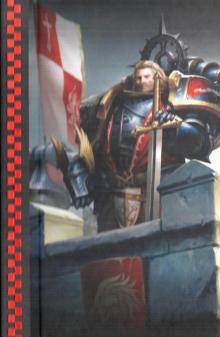 Lion El'Jonson- Lord of the First - David Guymer
Lion El'Jonson- Lord of the First - David Guymer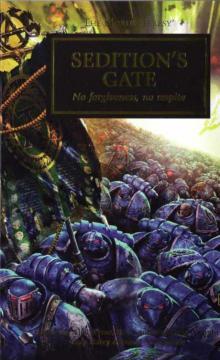 Sedition's Gate - Nick Kyme & Chris Wraight
Sedition's Gate - Nick Kyme & Chris Wraight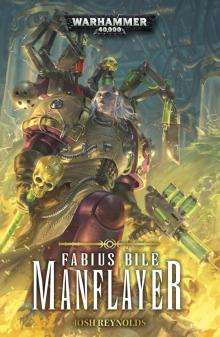 Manflayer - Josh Reynolds
Manflayer - Josh Reynolds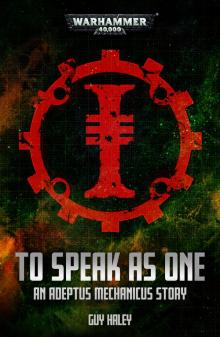 To Speak as One - Guy Haley
To Speak as One - Guy Haley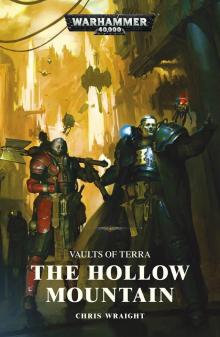 Vaults of Terra- The Hollow Mountain - Chris Wraight
Vaults of Terra- The Hollow Mountain - Chris Wraight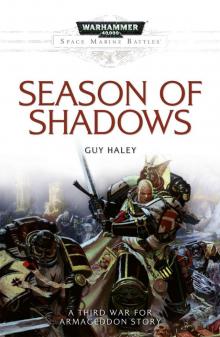 Season of Shadows - Guy Haley
Season of Shadows - Guy Haley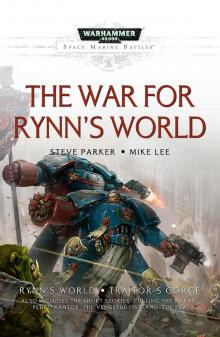 The War for Rynn's World - Steve Parker & Mike Lee
The War for Rynn's World - Steve Parker & Mike Lee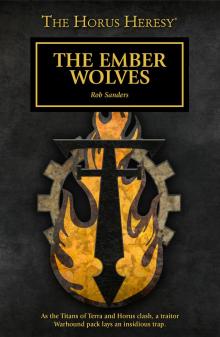 The Ember Wolves - Rob Sanders
The Ember Wolves - Rob Sanders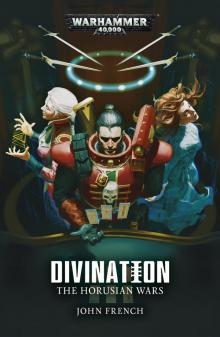 Divination - John French
Divination - John French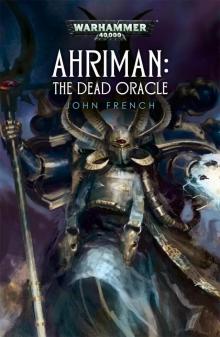 The Dead Oracle - John French
The Dead Oracle - John French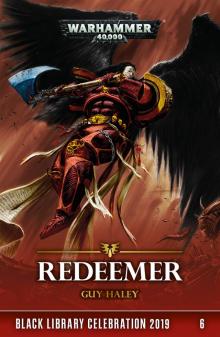 Redeemer - Guy Haley
Redeemer - Guy Haley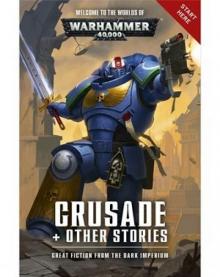 Crusade & Other Stories - Dan Abnett Et Al.
Crusade & Other Stories - Dan Abnett Et Al.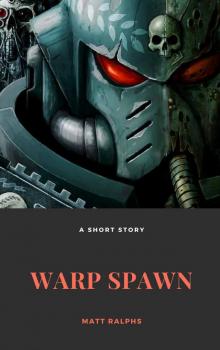 Warp Spawn - Matt Ralphs
Warp Spawn - Matt Ralphs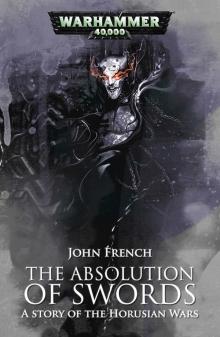 The Absolution of Swords - John French
The Absolution of Swords - John French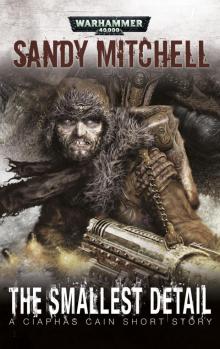 The Smallest Detail - Sandy Mitchell
The Smallest Detail - Sandy Mitchell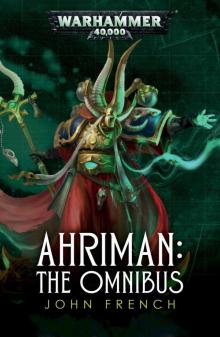 The Omnibus - John French
The Omnibus - John French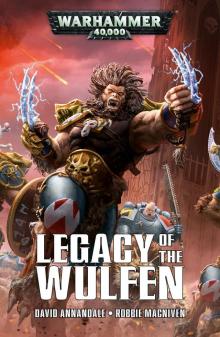 Legacy of the Wulfen - David Annandale & Robbie MacNiven
Legacy of the Wulfen - David Annandale & Robbie MacNiven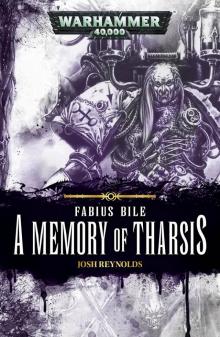 A Memory of Tharsis - Josh Reynolds
A Memory of Tharsis - Josh Reynolds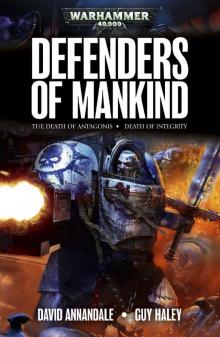 Defenders of Mankind - David Annandale & Guy Haley
Defenders of Mankind - David Annandale & Guy Haley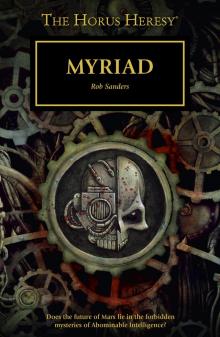 Myriad - Rob Sanders
Myriad - Rob Sanders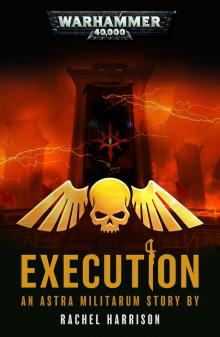 Execution - Rachel Harrison
Execution - Rachel Harrison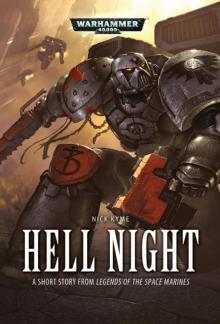 Hell Night - Nick Kyme
Hell Night - Nick Kyme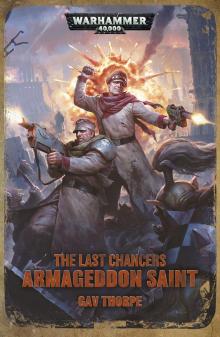 Armageddon Saint - Gav Thorpe
Armageddon Saint - Gav Thorpe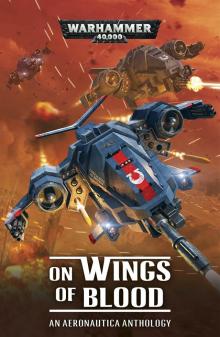 On Wings of Blood
On Wings of Blood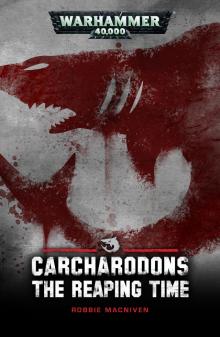 The Reaping Time - Robbie MacNiven
The Reaping Time - Robbie MacNiven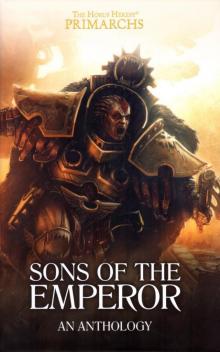 Sons of the Emperor
Sons of the Emperor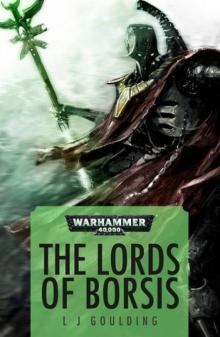 The Lords of Borsis - L J Goulding
The Lords of Borsis - L J Goulding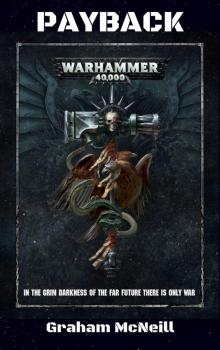 Payback - Graham McNeill
Payback - Graham McNeill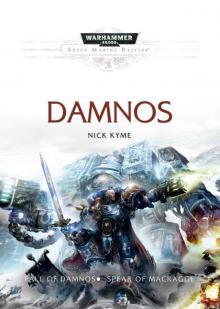 Damnos - Nick Kyme
Damnos - Nick Kyme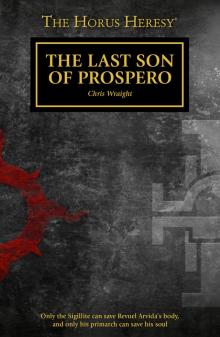 The Last Son of Prospero - Chris Wraight
The Last Son of Prospero - Chris Wraight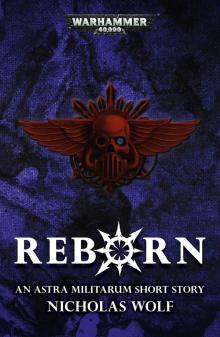 Reborn - Nicholas Wolf
Reborn - Nicholas Wolf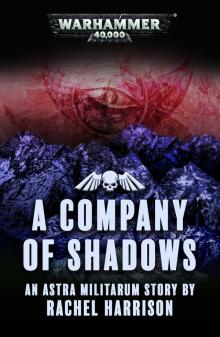 A Company of Shadows - Rachel Harrison
A Company of Shadows - Rachel Harrison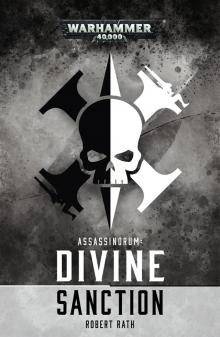 Assassinorum- Divine Sanction - Robert Rath
Assassinorum- Divine Sanction - Robert Rath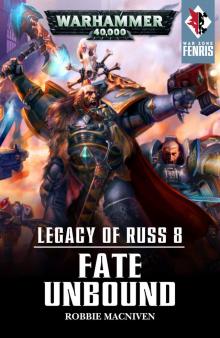 Fate Unbound - Robbie MacNiven
Fate Unbound - Robbie MacNiven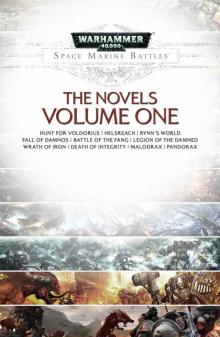 Space Marine Battles - the Novels Volume 1
Space Marine Battles - the Novels Volume 1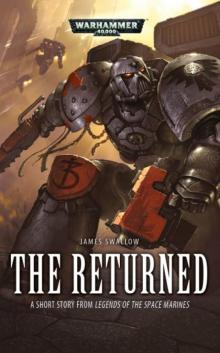 The Returned - James Swallow
The Returned - James Swallow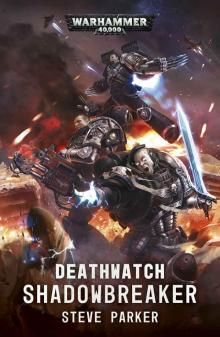 Shadowbreaker - Steve Parker
Shadowbreaker - Steve Parker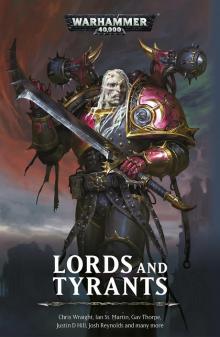 Lords and Tyrants
Lords and Tyrants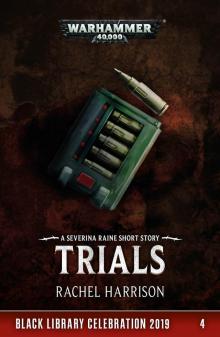 Trials - Rachel Harrison
Trials - Rachel Harrison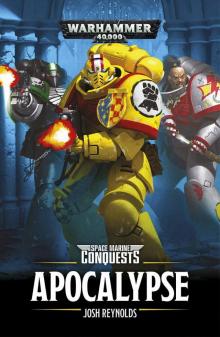 Apocalypse - Josh Reynolds
Apocalypse - Josh Reynolds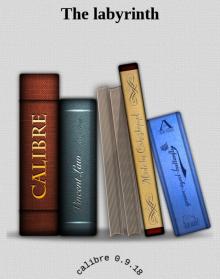 The labyrinth - Richard Ford
The labyrinth - Richard Ford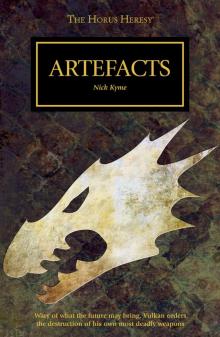 Artefacts - Nick Kyme
Artefacts - Nick Kyme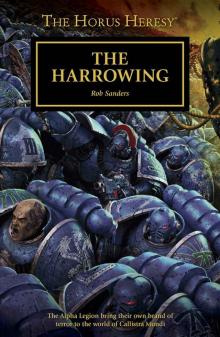 The Harrowing - Rob Sanders
The Harrowing - Rob Sanders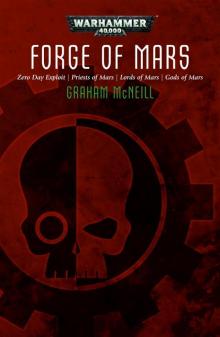 Forge of Mars - Graham McNeill
Forge of Mars - Graham McNeill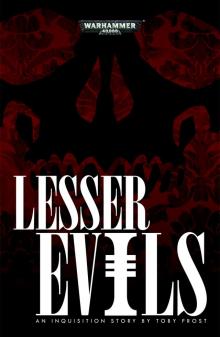 Lesser Evils - Toby Frost
Lesser Evils - Toby Frost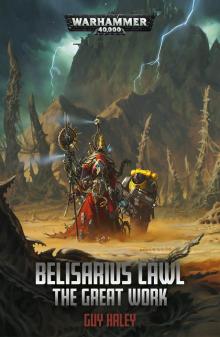 Belisarius Cawl- the Great Work - Guy Haley
Belisarius Cawl- the Great Work - Guy Haley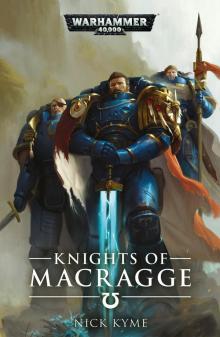 Knights of Macragge - Nick Kyme
Knights of Macragge - Nick Kyme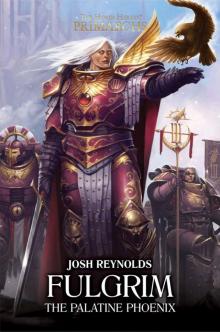 Fulgrim- The Palatine Phoenix - Josh Reynolds
Fulgrim- The Palatine Phoenix - Josh Reynolds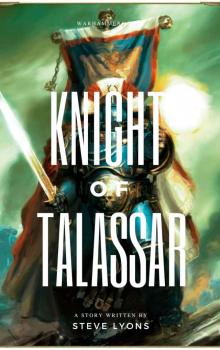 Knight of Talassar - Steve Lyons
Knight of Talassar - Steve Lyons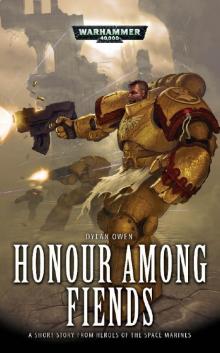 Honour Among Fiends - Dylan Owen
Honour Among Fiends - Dylan Owen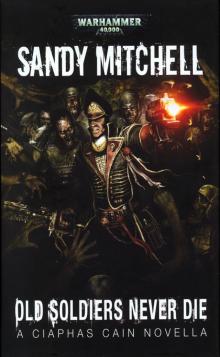 Old Soldiers Never Die - Sandy Mitchell
Old Soldiers Never Die - Sandy Mitchell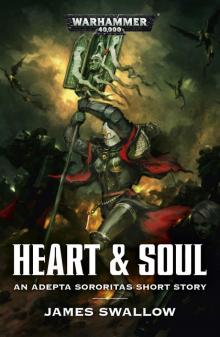 Heart & Soul - James Swallow
Heart & Soul - James Swallow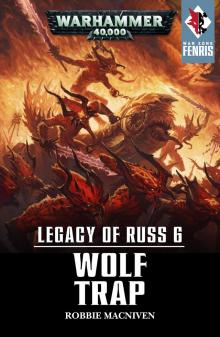 Wolf Trap - Robbie MacNiven
Wolf Trap - Robbie MacNiven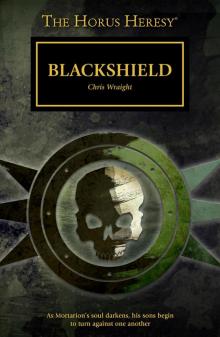 Blackshield - Chris Wraight
Blackshield - Chris Wraight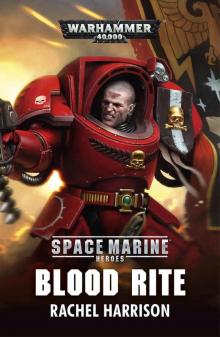 Blood Rite - Rachel Harrison
Blood Rite - Rachel Harrison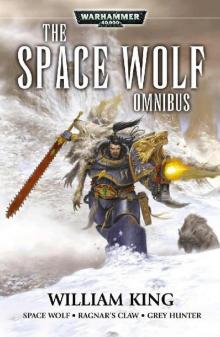 The Space Wolf Omnibus - William King
The Space Wolf Omnibus - William King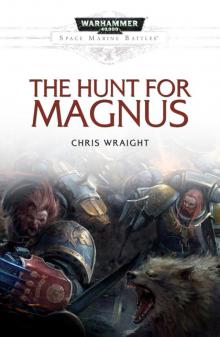 The Hunt for Magnus - Chris Wraight
The Hunt for Magnus - Chris Wraight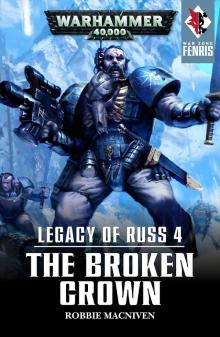 The Broken Crown - Robbie MacNiven
The Broken Crown - Robbie MacNiven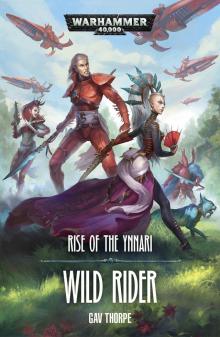 Wild Rider - Gav Thorpe
Wild Rider - Gav Thorpe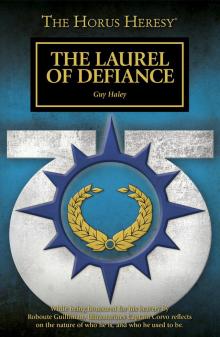 The Laurel of Defiance - Guy Haley
The Laurel of Defiance - Guy Haley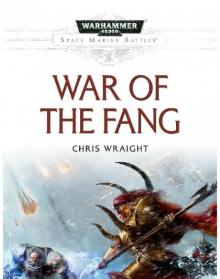 War of the Fang - Chris Wraight
War of the Fang - Chris Wraight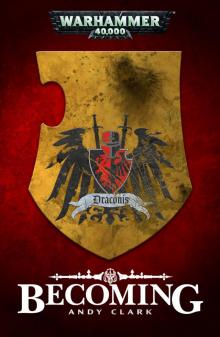 Becoming - Andy Clark
Becoming - Andy Clark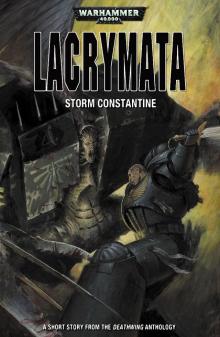 Lacrymata - Storm Constantine
Lacrymata - Storm Constantine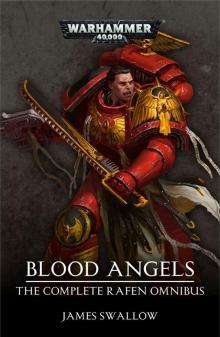 Blood Angels - The Complete Rafen Omnibus - James Swallow
Blood Angels - The Complete Rafen Omnibus - James Swallow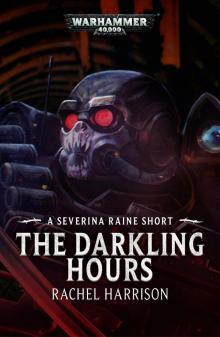 The Darkling Hours - Rachel Harrison
The Darkling Hours - Rachel Harrison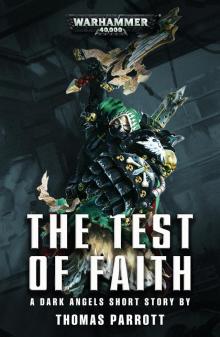 The Test of Faith - Thomas Parrott
The Test of Faith - Thomas Parrott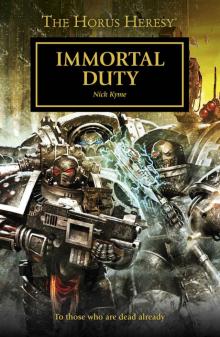 Immortal Duty - Nick Kyme
Immortal Duty - Nick Kyme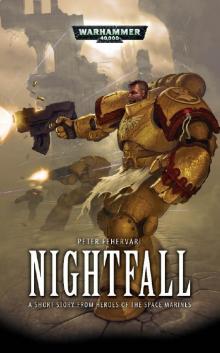 Nightfall - Peter Fehervari
Nightfall - Peter Fehervari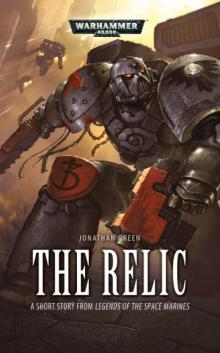 The Relic - Jonathan Green
The Relic - Jonathan Green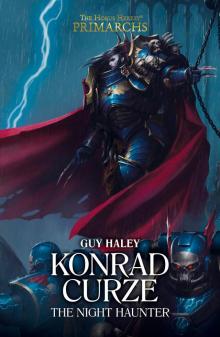 Konrad Curze the Night Haunter - Guy Haley
Konrad Curze the Night Haunter - Guy Haley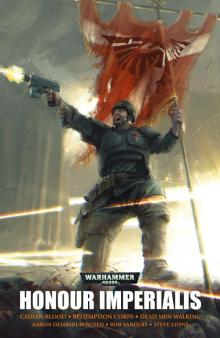 Honour Imperialis - Aaron Dembski-Bowden
Honour Imperialis - Aaron Dembski-Bowden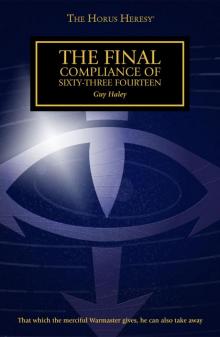 The Final Compliance of Sixty-Three Fourteen - Guy Haley
The Final Compliance of Sixty-Three Fourteen - Guy Haley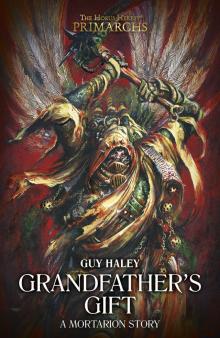 Grandfather’s Gift - Guy Haley
Grandfather’s Gift - Guy Haley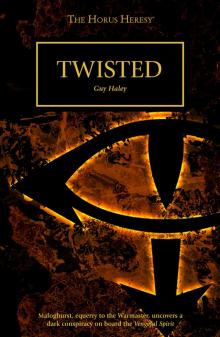 Twisted - Guy Haley
Twisted - Guy Haley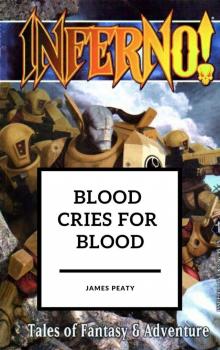 Blood Cries for Blood - James Peaty
Blood Cries for Blood - James Peaty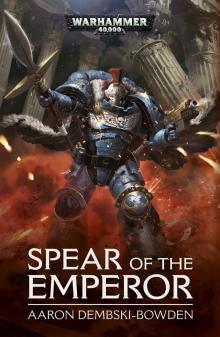 Spear of the Emperor - Aaron Dembski-Bowden
Spear of the Emperor - Aaron Dembski-Bowden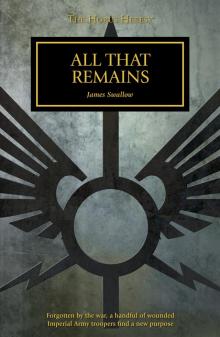 All That Remains - James Swallow
All That Remains - James Swallow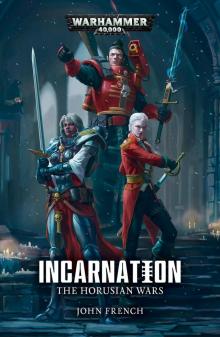 Incarnation - John French
Incarnation - John French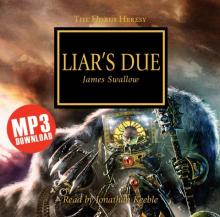 Liar's Due - Ben Swallow
Liar's Due - Ben Swallow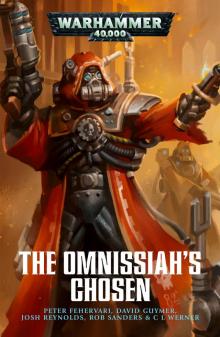 The Omnissiah's Chosen - Peter Fehervari
The Omnissiah's Chosen - Peter Fehervari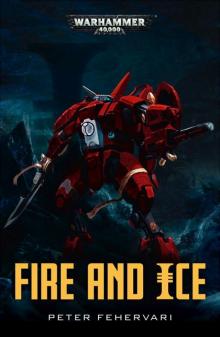 Fire and Ice - Peter Fehervari
Fire and Ice - Peter Fehervari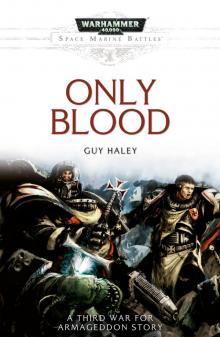 Only Blood - Guy Haley
Only Blood - Guy Haley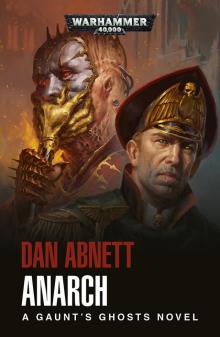 Anarch - Dan Abnett
Anarch - Dan Abnett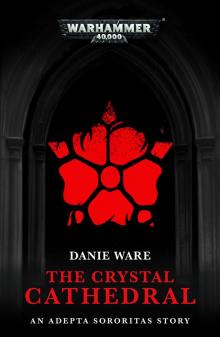 The Crystal Cathedral - Danie Ware
The Crystal Cathedral - Danie Ware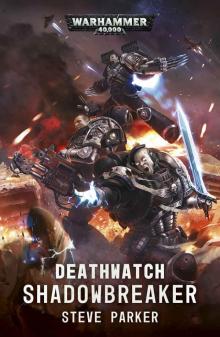 Shadowbreaker
Shadowbreaker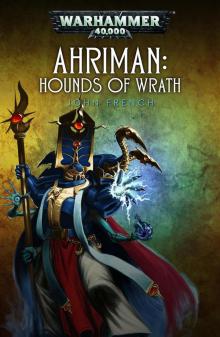 Hounds of Wrath - John French
Hounds of Wrath - John French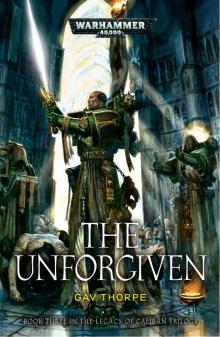 The Unforgiven - Gav Thorpe
The Unforgiven - Gav Thorpe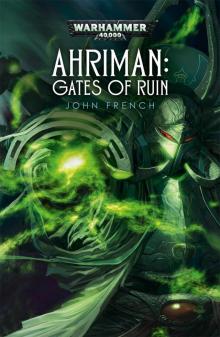 Gates of Ruin - John French
Gates of Ruin - John French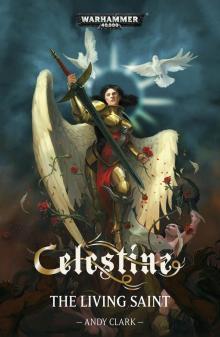 Celestine - Andy Clark
Celestine - Andy Clark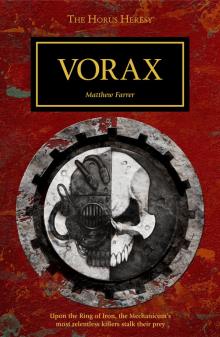 Vorax - Matthew Farrer
Vorax - Matthew Farrer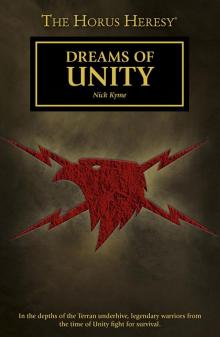 Dreams of Unity - Nick Kyme
Dreams of Unity - Nick Kyme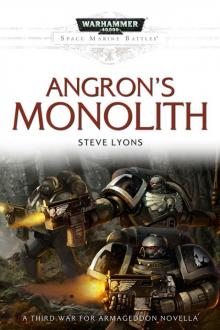 Angron's Monolith - Steve Lyons
Angron's Monolith - Steve Lyons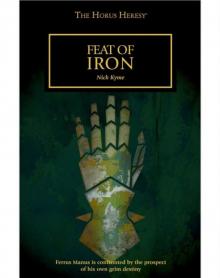 Feat of Iron - Nick Kyme
Feat of Iron - Nick Kyme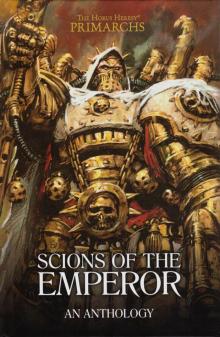 Scions of the Emperor
Scions of the Emperor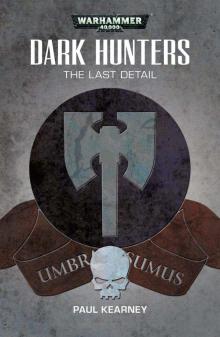 The Last Detail - Paul Kearney
The Last Detail - Paul Kearney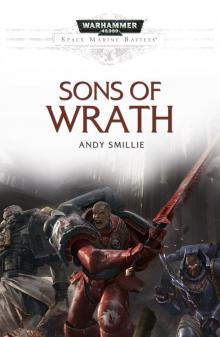 Sons of Wrath - Andy Smillie
Sons of Wrath - Andy Smillie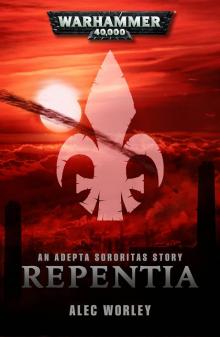 Repentia - Alec Worley
Repentia - Alec Worley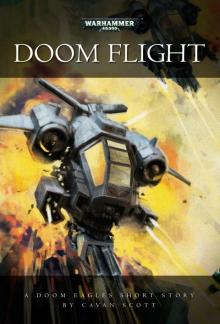 Doom Flight - Cavan Scott
Doom Flight - Cavan Scott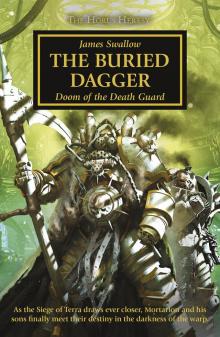 The Buried Dagger - James Swallow
The Buried Dagger - James Swallow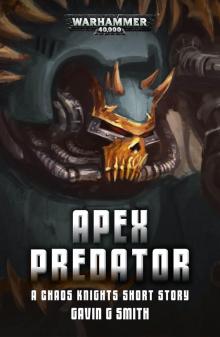 Apex Predator - Gavin G Smith
Apex Predator - Gavin G Smith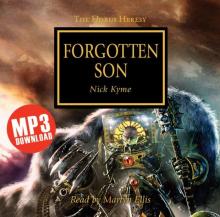 Forgotten Sons - Nick Kyme
Forgotten Sons - Nick Kyme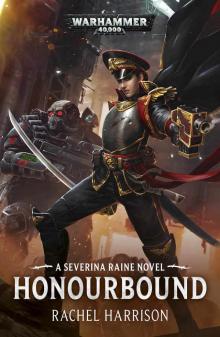 Honourbound - Rachel Harrison
Honourbound - Rachel Harrison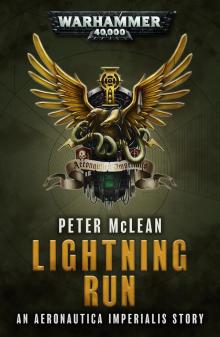 Lightning Run - Peter McLean
Lightning Run - Peter McLean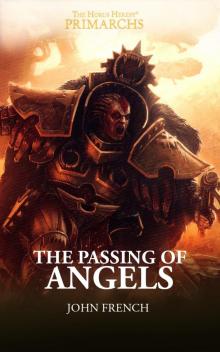 The Passing of Angels - John French
The Passing of Angels - John French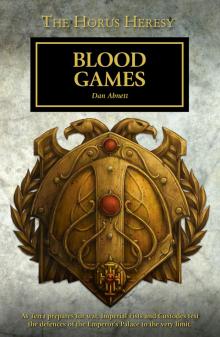 Blood Games - Dan Abnett
Blood Games - Dan Abnett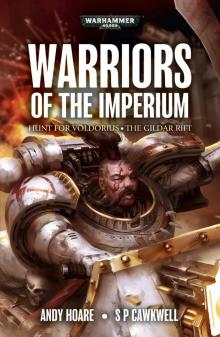 Warriors of the Imperium - Andy Hoare & S P Cawkwell
Warriors of the Imperium - Andy Hoare & S P Cawkwell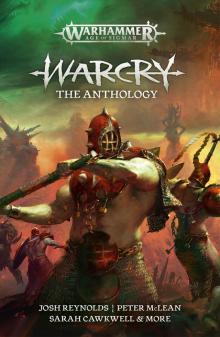 Warcry
Warcry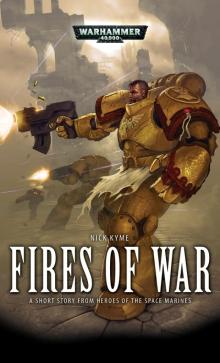 Fires of War - Nick Kyme
Fires of War - Nick Kyme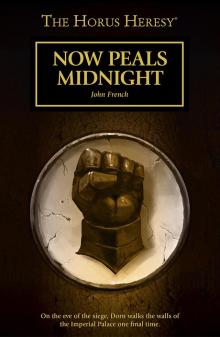 Now Peals Midnight - John French
Now Peals Midnight - John French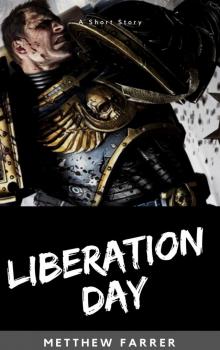 Liberation Day - Matthew Farrer
Liberation Day - Matthew Farrer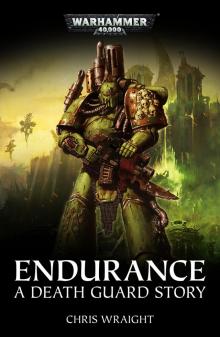 Endurance - Chris Wraight
Endurance - Chris Wraight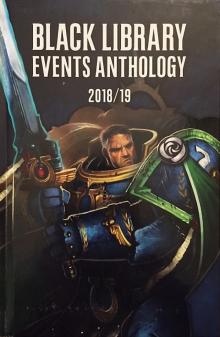 Black Library Events Anthology 2018-19
Black Library Events Anthology 2018-19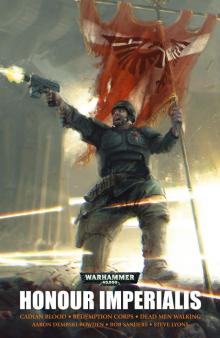 Honour Imperialis - Braden Campbell & Aaron Dembski-Bowden & Chris Dows & Steve Lyons & Rob Sanders
Honour Imperialis - Braden Campbell & Aaron Dembski-Bowden & Chris Dows & Steve Lyons & Rob Sanders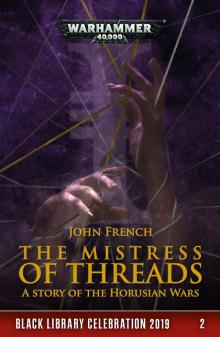 The Mistress of Threads - John French
The Mistress of Threads - John French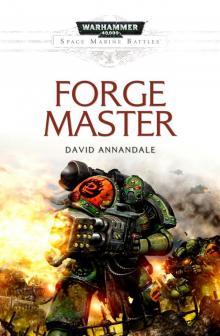 Forge Master - David Annandale
Forge Master - David Annandale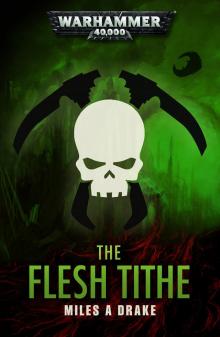 The Flesh Tithe - Miles A Drake
The Flesh Tithe - Miles A Drake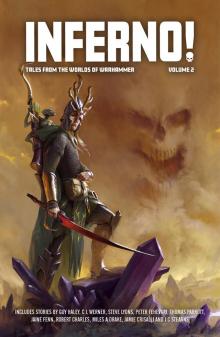 Inferno Volume 2 - Guy Haley
Inferno Volume 2 - Guy Haley Mercy of the Dragon - Nick Kyme
Mercy of the Dragon - Nick Kyme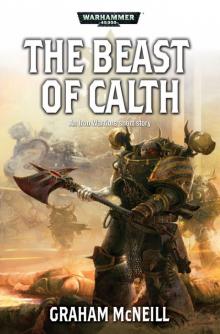 The Beast of Calth - Graham McNeill
The Beast of Calth - Graham McNeill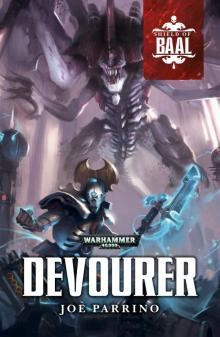 Devourer - Joe Parrino
Devourer - Joe Parrino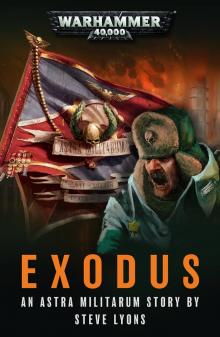 Exodus - Steve Lyons
Exodus - Steve Lyons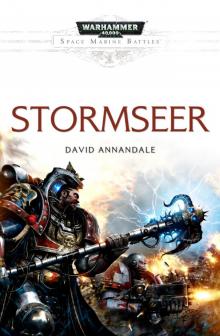 Stormseer - David Annandale
Stormseer - David Annandale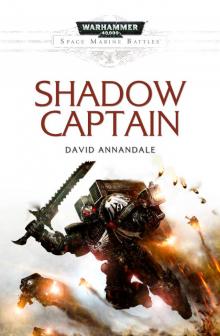 Shadow Captain - David Annandale
Shadow Captain - David Annandale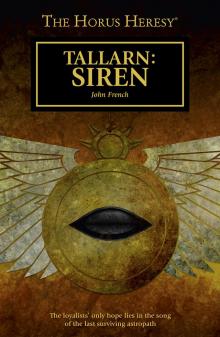 Tallarn- Siren - John French
Tallarn- Siren - John French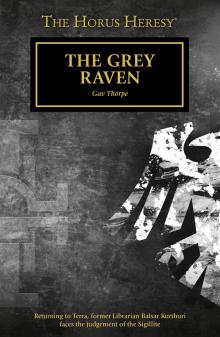 The Grey Raven - Gav Thorpe
The Grey Raven - Gav Thorpe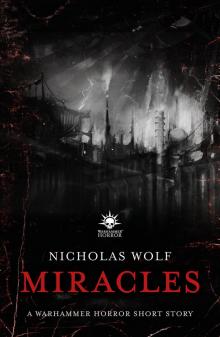 Miracles - Nicholas Wolf
Miracles - Nicholas Wolf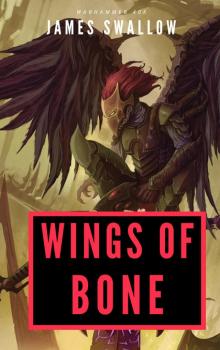 Wings of Bone - James Swallow
Wings of Bone - James Swallow